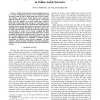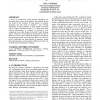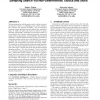335 search results - page 42 / 67 » Learning Simulation Control in General Game-Playing Agents |
120
click to vote
CDC
2010
IEEE
14 years 6 months ago
2010
IEEE
Online Social networks are increasingly being seen as a means of obtaining awareness of user preferences. Such awareness could be used to target goods and services at them. We cons...
GECCO
2007
Springer
15 years 6 months ago
2007
Springer
A series of evolutionary neural network simulations are presented which explore the hypothesis that learning factors can result in the evolution of long periods of parental protec...
ATAL
2008
Springer
15 years 1 months ago
2008
Springer
Keepaway is a sub-problem of RoboCup Soccer Simulator in which 'the keepers' try to maintain the possession of the ball, while 'the takers' try to steal the ba...
ATAL
2009
Springer
15 years 26 days ago
2009
Springer
Motion planning for mobile agents, such as robots, acting in the physical world is a challenging task, which traditionally concerns safe obstacle avoidance. We are interested in p...
119
click to vote
CORR
2011
Springer
14 years 6 months ago
2011
Springer
Modeling the behavior of imperfect agents from a small number of observations is a difficult, but important task. In the singleagent decision-theoretic setting, inverse optimal co...



